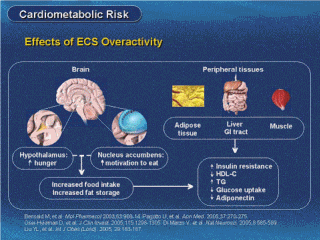| front |1 |2 |3 |4 |5 |6 |7 |8 |9 |10 |11 |12 |13 |14 |15 |16 |17 |18 |19 |20 |21 |22 |23 |24 |25 |26 | 27|28 |29 |30 |31 |32 |33 |34 |35 |36 |37 |38 |39 |40 |41 |42 |43 |44 |45 |46 |47 |48 |49 |review |
 |
The ECS is upregulated in the brain, liver, and
adipose tissue in chronic obesity. In the brain, the hypothalamus plays a
principal role in the control of feeding and regulation of body weight, and
excessive cannabinoid expression in the hypothalamus is associated with
obesity. CB1-R stimulation leads to dopamine release in the nucleus accumbens shell, which increases motivation to eat. These effects result in increased food intake and fat accumulation. In the peripheral arena, ECS overactivation promotes lipogenesis at the level of adipose tissue and the liver. ECS activity in the GI tract interferes with feelings of satiety, and CB1-R stimulation of skeletal muscle decreases glucose uptake. All of these central and peripheral effects contribute to the increased risk of dyslipidemia, insulin resistance, glucose intolerance and increased cardiometabolic risk. Bensaid M, Gary-Bobo M, Esclangon A, et al. The cannabinoid CB1 receptor antagonist SR141716 increases Acrp30 mRNA expression in adipose tissue of obese fa/fa rats and in cultured adipocyte cells. Mol Pharmacol. 2003;63:908-914. Pagotto U, Vicennati V, Pasquali R. The endocannabinoid system and the treatment of obesity. Ann Med. 2005;37:270-275. Osei-Hyiaman D, DePetrillo M, Pacher P, et al. Endocannabinoid activation at hepatic CB1 receptors stimulates fatty acid synthesis and contributes to diet-induced obesity. J Clin Invest. 2005;115:1298-1305. Di Marzo V, Matias I. Endocannabinoid control of food intake and energy balance. Nat Neurosci. 2005;8: 585-589. Liu YL, Connoley IP, Wilson CA, Stock MJ. Effects of the cannabinoid CB1 receptor antagonist SR141716 on oxygen consumption and soleus muscle glucose uptake in Lep(ob)/Lep(ob) mice. Int J Obes (Lond). 2005;29:183-187. |